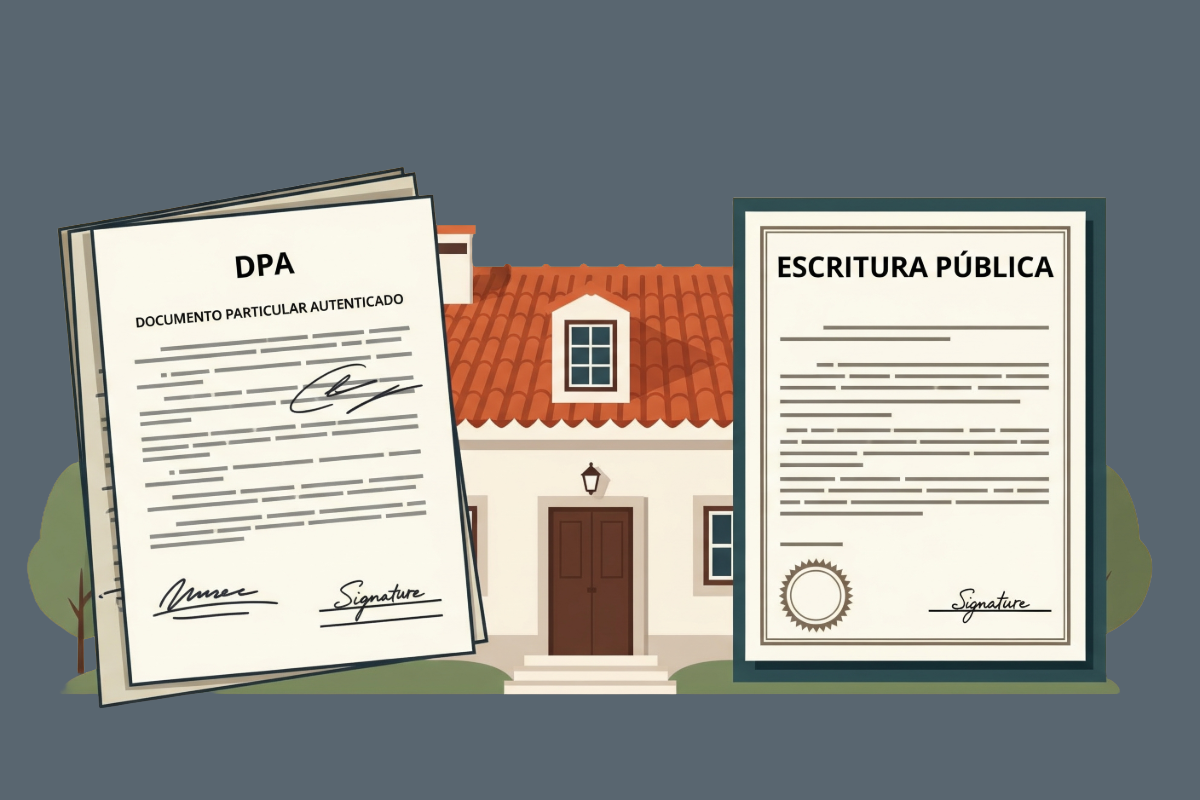Buying a home is an exciting milestone, but the legal steps can feel a bit overwhelming. In Portugal, the traditional way to finalize a property purchase has always been with a public deed (escritura pública). However, there is a modern, often more efficient, alternative you should know about: the Private Authenticated Document, or DPA (Documento Particular Autenticado).
This article will break down what the DPA is, how it works, and why it’s a popular choice for homebuyers in Portugal.
What Is a DPA and How Does It Work?
The DPA is a legal document that serves as a modern alternative to the traditional public deed. Instead of signing the final purchase agreement at a notary’s office, the DPA allows the buyer and seller to formalize the contract privately.
The key to the DPA’s validity is its authentication. Once the private contract is signed, it must be officially authenticated by a qualified professional, such as a lawyer, solicitor, notary, or registrar. This authentication process gives the DPA the exact same legal weight as a public deed, ensuring the transaction is secure and legally binding.
You can use a DPA even if you’re financing your home with a mortgage. Banks are fully prepared to formalize the loan and mortgage agreement using this document.
DPA vs. Public Deed: Key Differences
Both the DPA and the public deed legally formalize the purchase of a property. However, the DPA offers several advantages that can make the process smoother and more affordable.
- Cost-Effective: The costs associated with a DPA are generally lower. The fee for depositing a DPA is a fixed amount, usually around €20, while a traditional public deed can cost anywhere from €500 to €1,000 or more, as it includes notarial fees.
- Simpler and Faster: The DPA process is generally less bureaucratic and quicker to complete.
- Convenient Location: Authentication can be performed by authorized professionals at various locations, providing more flexibility than a notary’s office.
Required Documents for a DPA
Whether you choose a DPA or a public deed, you will need a similar set of documents to finalize the transaction. Be sure to have these ready:
- Valid ID for both the buyer and seller (Citizen’s Card or Passport).
- Updated property tax document (Caderneta Predial).
- Property registration certificate (Certidão do Registo Predial).
- Occupancy license (Licença de Utilização).
- Energy performance certificate (Certificado Energético).
- If applicable, all documentation related to your home loan.
The All-Important Property Registry
Regardless of whether you use a DPA or a public deed, the most critical final step is the property registry (registo predial). This is the legal procedure that officially transfers the ownership of the property into your name. Without this registry, your ownership isn’t fully protected. This step is completed at the Land Registry Office (Conservatória do Registo Predial) and involves mandatory fees.
While the DPA itself is often more affordable, remember that the property registry fees and mandatory taxes like the IMT (Property Transfer Tax) and Stamp Duty still apply to all property purchases.
What are the Risks of Using a DPA? ⚠️
While the DPA offers clear advantages, there are some potential risks to consider:
- Complexity of the Transaction: For straightforward transactions, a DPA is usually fine. However, in more complex situations—such as those involving multiple heirs or intricate legal conditions—the traditional public deed with a notary may provide a greater sense of legal security. A notary’s role is to ensure all legal requirements are met and to provide impartial advice, which can be particularly valuable in complicated cases.
- Less Formal Oversight: While the DPA is legally valid, the process is inherently less formal than a public deed signed in a notary’s office. The legal soundness of a DPA heavily depends on the competence and attention to detail of the professional who authenticates it.
- Dependence on the Professional: The DPA process is less standardized than a public deed. The final legal quality of the document relies on the professional you hire, whereas a notary’s process is designed to be formal and reassuring.
Final Pros and Cons ⚖️
Here is a quick summary to help you weigh your options:
Pros of Using a DPA
- Cost-Effective: Generally lower fees. The DPA deposit is a fixed €20, while public deed costs can be substantially higher.
- Speed and Flexibility: The process is typically faster and less bureaucratic.
- Equal Legal Validity: When properly authenticated and registered, it has the same legal force as a public deed.
Cons of Using a DPA
- Perceived Security: Some people feel a public deed offers a higher level of legal security, especially for complex transactions.
- Less Formal Oversight: The process is less standardized and relies heavily on the chosen professional.
- Not Ideal for Complex Situations: In cases with a high risk of future disputes, the formal process of a public deed might be the safer choice.
- Are you looking for expert advice when buying a property in Lagos?
- A selection of our best “Rental Income” properties in Lagos
- A selection of the best properties in Lagos Algarve
- “Buyers Guide” Everything you need to know when buying a property in Portugal
- Thinking of selling your property? > Sell With Steve





Join The Discussion